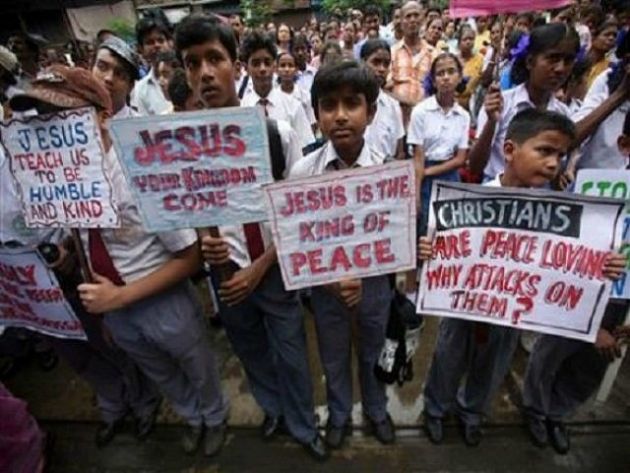India's elections kick off with calls to stop violence against Christians and those from other minority religions

India goes to the polls on April 19 for its massive endeavor involving nearly a billion voters to elect a new government amid growing concerns about the rising persecution of Christians.
Two new reports record a dramatic increase in acts of violence against Christians, according to Release International.
Release International says a top priority must be to repeal the divisive anti-conversion laws of the world's most populous nation of 1.4 billion people, which are leading to an increase in violence and arrests.
India prides itself on the scale of its parliamentary elections that finally end on June 1, ensuring that even those in the remotest corners and highest peaks of the vast country can cast their vote.
Intolerance is, however, growing towards other faiths as Hindu nationalism gains ground, reports Andrew Boyd for Release International.
The latest figures show an alarming rise in attacks against Christians and churches.
More than 2,600 political parties are registered in this election.
HINDU NATIONALISM
According to most analysts and political polling, the frontrunner is India's prime minister, Narendra Modi, and his Bharatiya Janata party (BJP) which has been in power since 2014 and is seeking a third term, The Guardian newspaper reported on April 18.
"Once a fringe Indian ideology, Hindu nationalism is now mainstream, thanks to Modi's decade in power," The Associated Press headlined a report.
"The Hindu nationalist policies of Modi and the BJP government are widely seen to have reshaped the political and cultural landscape of the country over the past decade, shifting it away from the secularism enshrined in the constitution – which guarantees equality for all religions – and towards Hindu majoritarian rule," The Guardian said.
Two new reports record a dramatic increase in acts of violence against Christians, according to Release International.
The Religious Liberty Commission of the Evangelical Fellowship of India (EFI) recorded a record 601 cases of persecution against Christians in India in 2023. That's a 45 percent increase.
And the United Christian Forum says the violence has continued into the first quarter of 2024. Their latest report documents more than 160 attacks to the middle of March.
'CULTURE OF HOSTILITY'
UK-based Release International supports the persecuted Church worldwide, and it warns that unless India's government takes action to calm the violence and overturn the culture of hostility, further bloodshed will result.
"We have seen a dramatic rise in intolerance towards Christians since the BJP first swept to power in 2014," says Paul Robinson, the CEO of Release International.
"Our partners in India report pastors beaten, churches attacked and prayer meetings disrupted at the hands of ultra-right wing Hindu militants. At the same time, states in India are passing anti-conversion laws which prevent Christians from sharing their faith with Hindus."
Release International said its partner in India provides legal assistance to many pastors.
It says that in Uttar Pradesh, a state in northern India and the country's most populous alone with over 241 million inhabitants, more than 130 church leaders are now under arrest and facing trial, many having been refused bail.
The Evangelical Fellowship of India reports a total of 440 pastors arrested in 2023.
The EFI describes the figure as "unprecedented" and says its findings "only scratch the surface."
"What we're seeing in India is the rise in right-wing militancy, underpinned by intolerance from the state," notes Paul Robinson.
"Our message to India is to act immediately to halt the spread of intolerance and repeal these anti-conversion laws. These laws fly in the face of India's constitution, which guarantees freedom of religion, including the freedom to propagate one's faith," said Robinson.
"India is the world's largest democracy, yet it is heading in a divisive and authoritarian direction. And where intolerance is allowed to rise, violence will inevitably follow."
Modi's Hindu nationalist agenda has won him support among swathes of India's 80 percent Hindu majority, often enabling him to transcend traditional caste and class barriers to win votes among poorer, rural, and lowest caste communities as well as affluent urban voters and the rising middle classes, The Guardian reported.
INDIA AS WORLD POWER
"He has also gained accolades for being seen to have elevated India into a world power being courted the West, and many of his supporters say Modi has made them proud to be Indian."
The ruling BJP and the India National Congress (INC) parties (and their coalition partners) are the primary two parties that people will decide between.
The BJP has had two straight elections of significant success, which means Narendra Modi has been prime minister since 2014. Broadly speaking, the INC is a centrist/center-left political party, and the BJP is a right-wing party with roots in Hindu nationalism, reported Open Doors.
India's government is similar to the United Kingdom's, in that the elections decide who will sit in the lower house of parliament, called the Lok Sabha or House of the People in India.
There are 543 seats, and a prime minister is elected from among the people who win those seats.
"Because the ruling party in India has significant ties to Hindutva, the ideology that says Indian identity is tied to Hinduism, another victory in this year's election could be continued difficulties for India's religious minorities, including Christians," Open Doors commented.
"These [elections] are very crucial, as this will decide the next five years," says Priya Sharma, an Open Doors partner in India.
"If the current government stays in power, there are chances that India will undergo a complete transformation into a Hindu nationalist state. India will be absolutely intolerant to Christians and other religious minorities."
